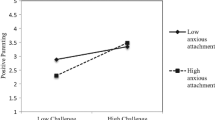Abstract
This study investigated the relations of self-reported childhood trauma and negative parenting styles to current levels of sociotropy and autonomy in a sample of 77 adult psychiatric inpatients. Controlling for depression symptoms, sociotropy was not significantly related to any of the parenting or trauma variables. Autonomy was related most strongly to emotional abuse and was also related to physical abuse, lack of parental care, and parental overprotection. Regression analyses controlling for depression and several other childhood variables indicated that emotional abuse was significantly related to sociotropy, while emotional abuse and lack of parental care were associated with autonomy. Sexual abuse, witnessing violence, emotional neglect, physical neglect, and loss were not found to be significant predictors of sociotropy or autonomy in these regression analyses. Results suggest that certain developmental experiences, particularly emotional abuse, are associated with sociotropy and autonomy and perhaps may contribute to the formation of these personality styles.
Similar content being viewed by others
REFERENCES
Andrews, B., & Brewin, C. R. (1990). Attributions of blame for marital violence: A study of antecedents and consequences. Journal of Marriage and the Family, 52, 757–767.
Beck, A. T. (1983). Cognitive therapy of depression: New perspectives. In P. J. Clayton & J. E. Barrett (Eds.), Treatment of depression: Old controversies and new approaches (pp. 265–290). New York: Raven Press.
Beck, A. T., Rush, A. J., Shaw, B. F., & Emery, G. (1979). Cognitive therapy of depression. New York: Harper & Row.
Blatt, S. J., & Homann, E. (1992). Parent- child interaction in the etiology of dependent and self-critical depression. Clinical Psychology Review, 12, 47–91.
Blatt, S. J., & Zuroff, D. C. (1992). Interpersonal relatedness and self-definition: Two prototypes for depression. Clinical Psychology Review, 12, 527–562.
Brewin, C. R., Andrews, B., & Furnham, A. (1996). Self-critical attitudes and parental criticism in young women. British Journal of Medical Psychology, 69, 69–78.
Brewin, C. R., Firth-Cozens, J., Furnham, A., & McManus, C. (1992). Self-criticism in adulthood and recalled childhood experience. Journal of Abnormal Psychology, 101, 561–566.
Brewin, C. R., & Vallance, H. (1997). Self-discrepancies in young adults and childhood violence. Journal of Interpersonal Violence, 12, 600–606.
First, M. B., Gibbon, M., Spitzer, R. L., Williams, J. B. W., & Benjamin, L. (1996). SCID-II user's guide. Biometrics Research Department, New York State Psychiatric Institute.
Gallagher, R. E., Flye, B. L., Hurt, S.W., Stone, M. H., & Hull, J.W. (1992). Retrospective Assessment of Traumatic Experience (RATE). Journal of Personality Disorders, 6, 99–108.
Gold, E. R. (1986). Long-term effects of sexual victimization in childhood: An attributional approach. Journal of Consulting and Clinical Psychology, 54, 471–475.
Kendall-Tackett, K. A., Williams, L. M., & Finkelhor, D. (1993). Impact of sexual abuse on children: A review and synthesis of recent empirical studies. Psychological Bulletin, 11, 164–180.
Koestner, R., Zuroff, D. C., & Powers, T. A. (1991). Family origins of adolescent self-criticism and its continuity into adulthood. Journal of Abnormal Psychology, 100, 191–197.
Kuyken, W., & Brewin, C. R. (1999). The relation of early abuse to cognition and coping in depression. Cognitive Therapy and Research, 23, 665–677.
McCranie, E. W., & Bass, J. D. (1984). Childhood family antecedents of dependency and self-criticism: Implications for depression. Journal of Abnormal Psychology, 93, 3–8.
Parker, G. (1990). The parental bonding instrument: A decade of research. Social Psychiatry and Psychiatric Epidemiology, 25, 281–282.
Parker, G., Tupling, H., & Brown, L. B. (1979). A parental bonding instrument. British Journal of Medical Psychology, 52, 1–10.
Rind, B., Tromovitch, P., & Bauserman, R. (1998). A meta-analytic examination of assumed properties of child sexual abuse using college samples. Psychological Bulletin, 124, 22–53.
Robins, C. J., Hayes, A. M., Block, P., Kramer, R. J., & Villena, M. (1995). Interpersonal and achievement concerns and the depressive vulnerability and symptom specificity hypotheses: A prospective study. Cognitive Therapy and Research, 19, 1–20.
Robins, C. J., Ladd, J., Welkowitz, J., Blaney, P. H., Diaz, R., & Kutcher, G. (1994). The personal style inventory: Preliminary validation studies of new measures of sociotropy and autonomy. Journal of Psychopathology and Behavioral Assessment, 16, 277–295.
Rose,D.T., & Abramson, L.Y. (1995, November). Developmental maltreatment and cognitive vulnerability to hopelessness depression. Paper presented at the 29th annual convention of the Association for the Advancement of Behavior Therapy, Washington, DC.
Rose,D. T., Abramson, L.Y., Hodulik, C. J., Halberstadt, L., & Leff, G. (1994). Heterogeneity of cognitive style among depressed inpatients. Journal of Abnormal Psychology, 103, 419–429.
Rosenfarb, I. S., Becker, J., & Mintz, J. (1994). Dependency, self-criticism, and perceptions of socialization experiences. Journal of Abnormal Psychology, 103, 669–675.
Whiffen, V. E., & Sasseville, T. M. (1991). Dependency, self-criticism, and recollections of parenting: Sex differences and the role of depressive affect. Journal of Social and Clinical Psychology, 10, 121–133.
Author information
Authors and Affiliations
Rights and permissions
About this article
Cite this article
Mendelson, T., Robins, C.J. & Johnson, C.S. Relations of Sociotropy and Autonomy to Developmental Experiences Among Psychiatric Patients. Cognitive Therapy and Research 26, 189–198 (2002). https://doi.org/10.1023/A:1014569703020
Issue Date:
DOI: https://doi.org/10.1023/A:1014569703020



